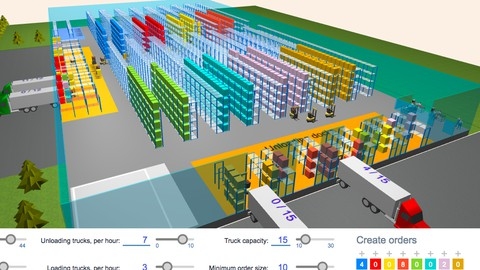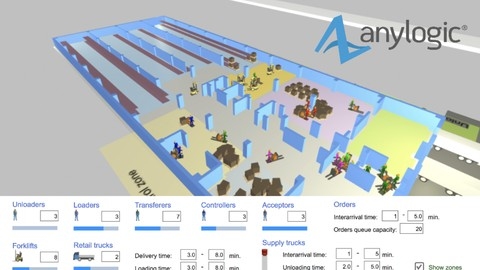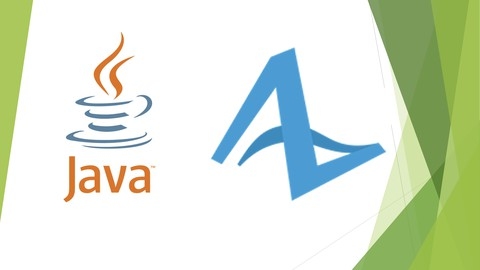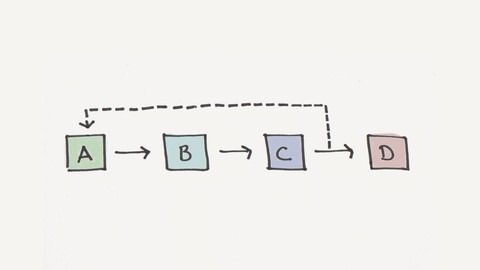Simulation modeling is a powerful technique used to analyze complex systems and predict their behavior under different conditions.
It plays a crucial role in various fields, including manufacturing, healthcare, logistics, and finance.
By learning simulation modeling, you can optimize processes, evaluate different scenarios, and make informed decisions to improve efficiency and reduce risks.
However, finding a comprehensive and engaging AnyLogic course can be a challenge.
You’re looking for a course that covers both the theoretical foundations and practical applications of simulation modeling, while also providing hands-on experience with the AnyLogic software.
For the best AnyLogic course overall on Udemy, we recommend Fundamentals of Simulation Modelling using Anylogic.
This course provides a comprehensive introduction to AnyLogic, covering Discrete Event Simulation, Agent-Based Modeling, and System Dynamics.
You’ll learn to build various simulation models, from call centers to airports, and gain practical experience in using Java to enhance your models.
While Fundamentals of Simulation Modelling using Anylogic is our top pick, we’ve also reviewed other excellent AnyLogic courses on Udemy that cater to different learning styles and goals.
Continue reading to discover more options and find the perfect course to embark on your simulation modeling journey.
Fundamentals of Simulation Modelling using Anylogic
This Anylogic course begins with the fundamentals of simulation modeling, introducing you to Discrete Event Simulation (DES) and Agent-Based Modeling (ABMs).
You learn to build models in Anylogic, using it to create simulations of various systems.
The course then dives into building a call center model, using Anylogic blocks like Queue Block, ResourcePool, and Service Block.
You discover how to model variability, optimize performance, and analyze different scenarios within your simulations.
You are then introduced to Java programming, learning how to integrate Java code within Anylogic to enhance your models.
You will become proficient in using Java to add complexity and dynamic behavior to your simulations, making them more realistic and powerful.
The course then delves into ABMs, teaching you how to simulate systems with multiple interacting agents.
You build models like a flu outbreak simulation and a supply chain model, understanding how individual agents impact the overall system’s behavior.
Finally, you apply your knowledge to real-world scenarios.
You learn to build a detailed airport simulation, modeling pedestrian flow, queue management, and even incorporating a COVID-19 spread scenario.
You also explore warehouse operations, learning how to model warehouse processes and connect your simulations to external databases.
Through these practical examples, you gain a deeper understanding of how to use Anylogic for analyzing real-world data and solving complex problems.
Discrete-Events and Agent-Based simulations with AnyLogic
This course begins by introducing you to the fundamentals of AnyLogic.
You install the software, learn your way around its layout, and start coding with Java.
You pick up essential programming skills, grasping variables, functions, operators, and conditionals – the building blocks of any simulation.
Through practical exercises, you learn to apply these concepts, solidifying your foundation in Java within the AnyLogic environment.
You then transition to the exciting world of multi-method modeling, where you discover how to combine different simulation approaches like discrete-event and agent-based modeling.
You apply your Java knowledge to create your first models, simulating scenarios like a bustling shop, an efficient call center, or a popular dating app.
As you build these models, you encounter key concepts like distributions, queues, and user interfaces, gaining practical experience in designing interactive simulations.
The course then challenges you to apply your knowledge to building complex simulations.
You learn how to model intricate systems like a Bank Office, a bustling Job Shop, and even a high-tech Wind Turbine.
You delve into advanced AnyLogic features, including the use of 3D modeling, taking your simulation skills to the next level.
You’ll also get to design your own Bank Model, putting your learning into practice.
You then dive into the powerful features of AnyLogic, exploring the world of databases and GIS.
You discover how to integrate these technologies into your models, allowing you to create realistic representations of real-world scenarios.
You learn how to leverage Java classes and utilities, further expanding your programming toolkit.
To top it off, you’ll even master the Excel API, allowing you to connect your simulations with real-world data.
The course culminates in a section on advanced simulations.
You deepen your understanding of statecharts, collections, and how to model intricate systems.
You then face the ultimate test of your skills: challenging projects that push your abilities to the limit.
These projects require you to integrate everything you’ve learned, from basic Java to advanced modeling techniques.
You build simulations of complex systems, such as a Medical Center, a sophisticated Aircraft Simulation, and a high-volume Call Center.
Java for AnyLogic
This course equips you with the Java skills needed to build sophisticated simulations in AnyLogic.
You’ll start with fundamental concepts like variables, functions, and loops, which form the building blocks of any Java program.
The course uses quizzes to solidify your understanding of each concept along the way.
You’ll then transition to more advanced topics, mastering collections like lists, sets, and maps.
These tools will allow you to organize and manipulate data efficiently within your AnyLogic models.
You’ll delve into the world of object-oriented programming, exploring classes, inheritance, and interfaces.
These concepts are crucial for building modular and reusable code, ultimately making your AnyLogic models more robust and adaptable.
The course goes beyond the basics, teaching you how to compare objects effectively using both the == operator and the equals() method.
This knowledge ensures you’re comparing objects correctly within your simulations, avoiding potential errors.
Finally, you’ll explore predefined lists (enumerators) and gain a deep understanding of access levels within Java.
You’ll even uncover the intricacies of why Java employs different methods for checking object equality.
The course provides a comprehensive exploration of using Java in AnyLogic, from foundational concepts to nuanced techniques.
System Dynamics Simulations With AnyLogic
This AnyLogic course equips you with the skills to build and analyze complex systems.
You begin by mastering system dynamics fundamentals, including stocks and flows, differential equations, and causal loop diagrams.
Using AnyLogic software, you will build models, starting with simple first-order feedback loops and progressing to more complex concepts like third-order delays.
You will test these models with validation tests and parameter variation experiments, using techniques like sensitivity analysis and parameter calibration.
You’ll then delve into advanced AnyLogic features, mastering arrays and multidimensional arrays to represent complex systems.
You’ll learn to use databases for table functions and parameters, analyze data with forecasting and trend analysis, and even edit variables with JAVA.
Importing models from Vensim is also covered.
The course explores system dynamics archetypes like “Limits to Growth”, “Eroding Goals”, and “Tragedy of the Commons.”
You will develop an understanding of common system behaviors like overshoot and collapse, damped oscillations, and the impacts of shifting the burden in a system.
The course culminates in a final project where you will create a hybrid model, combining system dynamics with agent-based modeling to analyze and develop policies for complex real-world problems.




